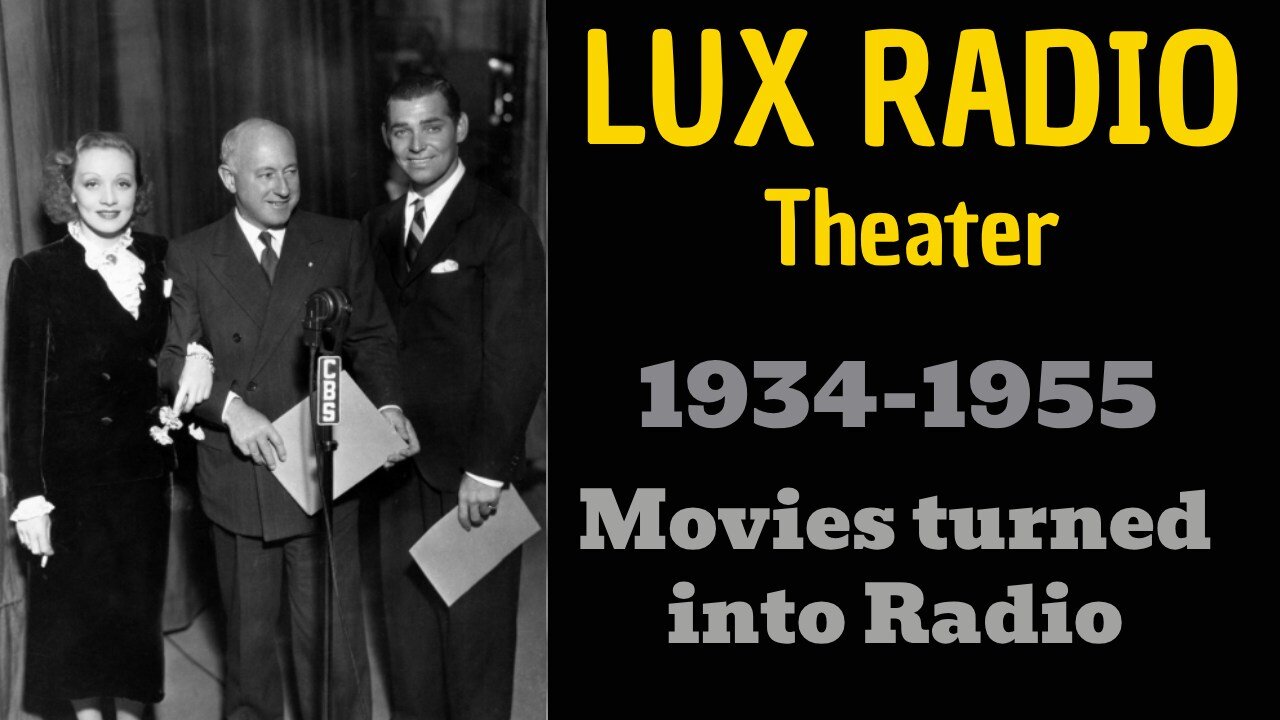Premium Only Content

Lux Radio 38/06/06 (ep179) A Doll's House (Joan Crawford, Basil Rathbone)
Plot
As described in a film magazine, in a slightly modernized version of the story that could take place in any town, Torvald Helmer is ill at home, and is ordered by his physician Dr. Rank to a southern climate. His wife Nora forges her father's name to a bank note to raise money to save her husband's life.
Six years later, when she has but one payment left on the note, Nils Krogstad threatens to expose her unless she intercedes and prevents her husband from discharging him from the bank. Nora begs her husband to have Krogstad remain. Torvald learns her reason for her request and accuses Nora unjustly.
When Krogstad returns Nora's note marked "paid," Torvald is overjoyed that his own reputation is saved and agrees to overlook the past. Nora, however, decides that her first duty is to be a human being and leaves her husband and children. She walks out into the storm and declares that it is "the end and the beginning."
Lux Radio Theatre was indisputably the biggest, most important, most expensive drama anthology program on radio. It ran from October 14, 1934 until June 7, 1955, then continued on television as Lux Video Theatre until 1957. In all, some 926 episodes were broadcast, providing a record of the most important entertainment events in American theatre and, later, film.
The show was first broadcast on the NBC Blue Network on Sundays at 2:30 PM. The show featured adaptations of successful Broadway plays when it was produced out of New York, such as Seventh Heaven, the first production starring Miriam Hopkins, Smilin' Through, Berkeley Square, Daddy Long Legs, Peg O' My Heart and Way Down East. On July 29, 1935, the show moved to Monday night at 9:00 PM on CBS, where it would stay until June 29, 1954. The show moved to Hollywood on May 25, 1936 with the production of The Legionnaire and the Lady, based on the film Morocco, starring Marlene Dietrich and Clark Gable. The audience for this production was estimated as high as 40 million. The show featured many of the most important films of the period, adapted to fit the 60 minute time slot. Some of the titles for 1939 should indicate the caliber and range of shows: Stage Door, Ceiling Zero, So Big, It Happened One Night, The Lives of a Bengal Lancer, Lady for a Day, The Life of Emile Zola, Tovarich, Only Angels Have Wings, The Prisoner of Zenda, The Awful Truth, Wuthering Heights, You Can't Take It With You, The Old Maid and Goodbye, Mr Chips. For its last season, (1954-1955), the show moved to Tuesday nights at 9 on NBC.
Lux Radio Theatre was always broadcast live, with a studio audience and a full orchestra accompanying the performance and providing musical transitions between scenes. As many film actors were used to numerous takes and not live performance, they sometimes suffered acute stage fright before the show. However, since most received $5,000 for their performance -- in addition to free publicity for upcoming pictures -- actors appeared in their original screen roles if they were available. Indeed, production would halt if necessary, on a film if performers were called to appear on Lux. When the actors were not available, others stepped in. The plays were assembled and rehearsed for a week, in sharp contrast to many other shows, which required a minimal of an actor's time. Regular players for the series included Jim and Marian Jordan, otherwise known as Fibber McGee and Molly. Hosts included Cecil B. DeMille (1936-1945), William Keighley (1945-1952) and Irving Cummings (1952-1955). Directors included Tony Stanford, Frank Woodruff, Fred MacKaye and Earl Ebi.
-
 LIVE
LIVE
Redacted News
23 minutes ago"This is an ACT OF WAR!" Israel Bombs Qatar - Middle East Descending into Chaos | Redacted
15,607 watching -
 LIVE
LIVE
vivafrei
1 hour agoCash for Criminals? Did Judge Wrongly Release Accused Murderer? Epstein Doc Release! Swalwell Sucks!
11,692 watching -

The Quartering
2 hours agoToday's Breaking News! Greta FAKES Drone Attack, Animal Cruelty Spike & Cracker Barrel
64.4K10 -
 1:15:17
1:15:17
Awaken With JP
2 hours agoKaren Strikes Again, There is No Crime, Communism Succeeds! - LIES Ep 107
14.5K10 -
 LIVE
LIVE
Stephen Gardner
23 minutes ago🔥Tucker HUMILIATES Mark Cuban + Democrat Mayors ABANDON Party!
408 watching -
 11:37
11:37
Robbi On The Record
12 days agoThe Devil is in the Branding..
21.8K17 -
 LIVE
LIVE
The HotSeat
1 hour ago👉 STOP Blaming Each Other — Look at the Media!
388 watching -
![[Ep 744] ICE Storm Hits Chicago | Another Innocent Woman Slain in Auburn, AL | Islam Invasion](https://1a-1791.com/video/fww1/9b/s8/1/Y/a/w/g/Yawgz.0kob.1-small-Ep-744-ICE-Storm-Hits-Chica.jpg) LIVE
LIVE
The Nunn Report - w/ Dan Nunn
1 hour ago[Ep 744] ICE Storm Hits Chicago | Another Innocent Woman Slain in Auburn, AL | Islam Invasion
95 watching -
 1:39:20
1:39:20
Russell Brand
4 hours agoMedia Lies & Setups? Tommy Robinson’s Panodrama Watch Along - SF630
100K15 -
 1:56:56
1:56:56
MattMorseTV
3 hours ago $3.99 earned🔴Trump's MASSIVE Press Briefing UPDATE.🔴
9.82K28